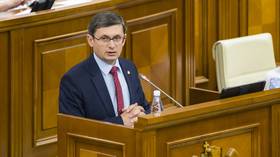Moldova could leave club of former Soviet republics

Moldova could terminate its membership in the Commonwealth of Independent States (CIS) – an organization comprised of former Soviet republics – the speaker of the country’s parliament, Igor Grosu, has revealed. The official said he is already preparing a bill that would pave the way for Chisinau’s departure from the group.
Speaking to Moldova’s NewsMaker media outlet on Monday, Grosu said he had “initiated the procedure of Moldova’s departure from the CIS’ inter-parliamentary assembly.” He added that this would be the “first step toward leaving the commonwealth.”
According to the speaker, he has already discussed his proposal with citizens, the ruling Party of Action and Solidarity, and President Maia Sandu.
The media outlet quoted Grosu as saying that he intends to present his initiative to Prime Minister Dorin Recean and prepare a bill in the near future.
“After the CIS founder, Russia, barbarically attacked Ukraine, this organization can no longer be called a commonwealth,” the speaker argued.
The commonwealth was founded in late 1991 amid the death throes of the Soviet Union. The organization is currently made up of 11 states with different status: Armenia, Azerbaijan, Belarus, Kazakhstan, Kyrgyzstan, Moldova, Russia, Tajikistan, Turkmenistan, Ukraine, and Uzbekistan.
Speaking to Russia’s RIA Novosti and Rossiya 24 media outlets in early February, Foreign Minister Sergey Lavrov expressed concern that Moldova could become a new “anti-Russia,” akin to Ukraine.
He claimed that the West had managed to install a pliant president at the helm in the country “through some very peculiar methods, far from free and democratic [ones].”
According to Lavrov, Sandu is “rushing into NATO” and is not averse to the prospect of merging Moldova with neighboring Romania.
Sandu’s predecessor, Igor Dodon, also warned in January that she could turn Moldova into “cannon fodder” in NATO’s proxy war with Russia.
In a Telegram post, Dodon accused the incumbent president of drawing the country into NATO while “acting on the orders of overseas masters.” The former leader claimed that such a move would run counter to the policy of neutrality enshrined in the Moldovan Constitution, as well as the will of the Moldovan people, as indicated by opinion polls.
Speaking to the Western press earlier that month, Sandu revealed that “there is a serious discussion” underway in Chisinau “about our capacity to defend ourselves, whether we can do it ourselves, or whether we should be part of a larger alliance.”
While she has stopped short of directly referring to NATO membership, Sandu has consistently implemented pro-Western policies since her election in 2020.
Moldova has actively cooperated with NATO in recent years, sending troops to participate in the military bloc’s force in Kosovo.
The country was also granted EU candidate status last June.













